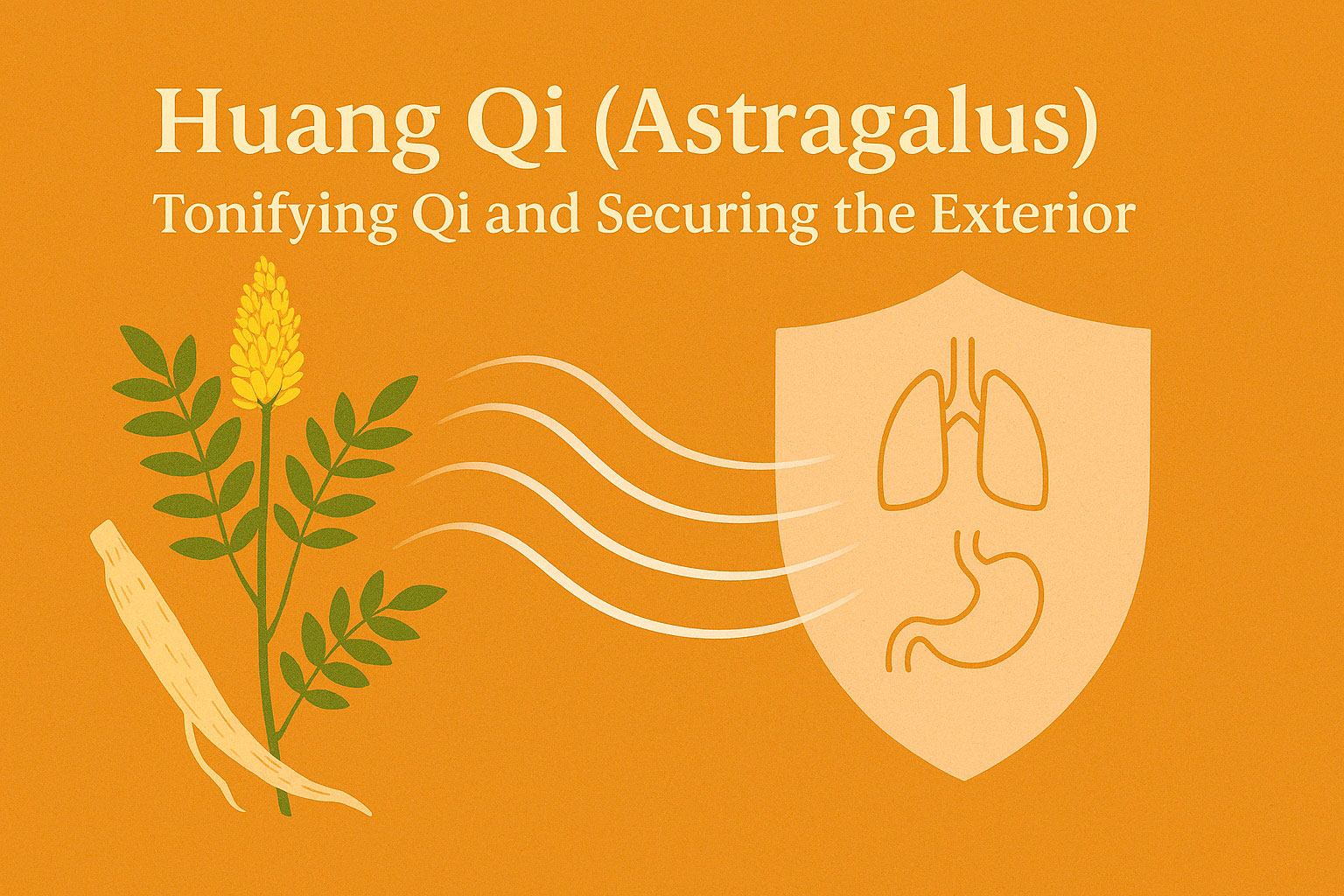In Traditional Chinese Medicine (TCM), Huang Qi (黄芪) — known in the West as Astragalus root — is one of the most important Qi-tonifying herbs. Sweet, slightly warm, and deeply nourishing, Huang Qi is best known for its ability to boost energy, strengthen immunity, and protect the body’s surface against external pathogens.
This article explores Huang Qi’s traditional functions, clinical applications, and modern research that supports its use in boosting health and resilience.
🔶 Botanical and Energetic Profile
- Chinese name: 黄芪 (Huáng Qí)
- Latin name: Astragalus membranaceus
- Taste & Nature: Sweet, slightly warm
- Meridians entered: Lung, Spleen
Huang Qi is often considered “the shield herb”, protecting the body while also strengthening it from within.
🔶 Functions of Huang Qi in TCM
| Function | Description |
|---|---|
| Tonifies Qi and raises Yang | Treats fatigue, prolapse, poor appetite, weak limbs |
| Strengthens the Spleen and Lung | Improves digestion, stops spontaneous sweating |
| Secures the Exterior and stops sweating | Enhances Wei Qi to resist Wind-Cold invasion |
| Promotes tissue regeneration and wound healing | Especially when combined with herbs like Dang Gui |
| Promotes urination and reduces edema | Especially for superficial fluid accumulation |
🔶 Common Formulas Containing Huang Qi
| Formula | Main Application |
|---|---|
| Yu Ping Feng San (Jade Windscreen Powder) | Boosts Wei Qi, prevents colds and allergies |
| Bu Zhong Yi Qi Tang | Raises Qi and treats organ prolapse or chronic fatigue |
| Sheng Mai San | Tonifies Qi and Yin for chronic weakness or palpitations |
| Shi Quan Da Bu Tang | Combines Qi and Blood tonics for overall deficiency |
| Huang Qi Jian Zhong Tang | For Spleen Qi deficiency with abdominal pain and cold |
🔶 Dosage and Preparation
- Typical dosage: 9–30g in decoction (higher in chronic conditions)
- Often combined with Dang Shen, Bai Zhu, Fang Feng, or Dang Gui
- May be used as:
- Decoction
- Powder
- Capsules
- Herbal soup ingredient
📌 In preventive medicine, Huang Qi is often added to daily teas or congees to support Wei Qi (defensive energy).
🔶 Modern Research Highlights
Numerous studies have explored Huang Qi’s pharmacological actions:
✅ Immunomodulation
- Enhances macrophage activity, NK cell function, and T-lymphocyte response
- Used in adjunctive cancer therapy and chronic viral infections
✅ Anti-fatigue and adaptogenic effects
- Helps reduce physical and mental fatigue
- Supports adrenal and mitochondrial function
✅ Anti-inflammatory and antioxidant
- Reduces oxidative stress and inflammatory markers
- Protects against chronic inflammatory diseases
✅ Cardiovascular protection
- Improves microcirculation
- Shown to help regulate blood pressure and protect heart tissue
🔶 Safety and Cautions
- Generally safe and well-tolerated
- Avoid during acute febrile illnesses (e.g., active cold or flu with fever) as it may “lock in” pathogens
- Best for preventive care or recovery phase, not acute infections
🔶 Conclusion
Huang Qi is a powerful, versatile tonic herb that supports the body’s deepest energies while shielding it from external threats. Whether used to combat fatigue, prevent illness, or recover after long-term depletion, Huang Qi exemplifies the TCM principle of “strengthening the root to resist the branch.”
Its relevance in both ancient and modern healthcare systems reflects its enduring value as one of the great protectors of health.


发表回复